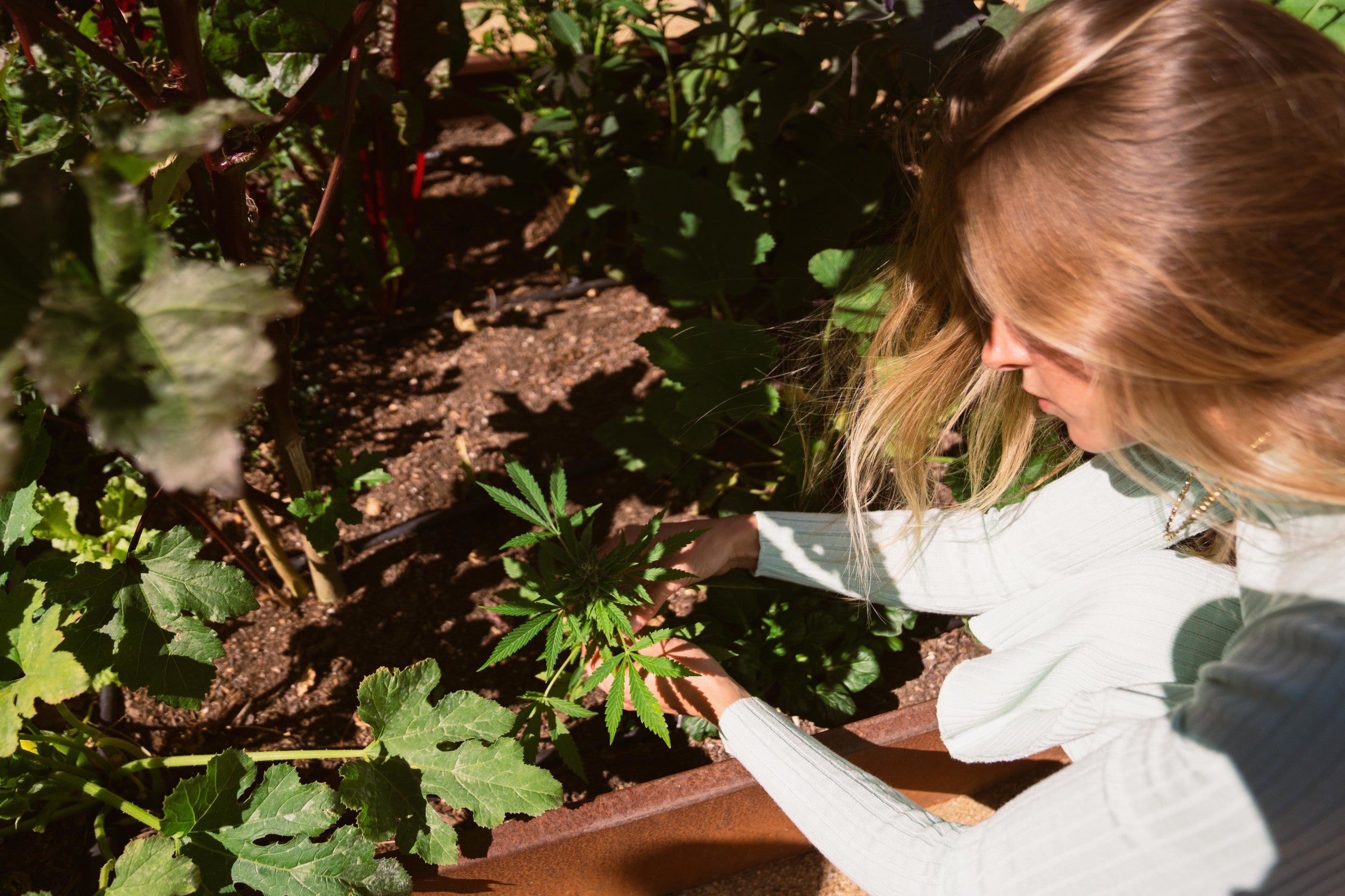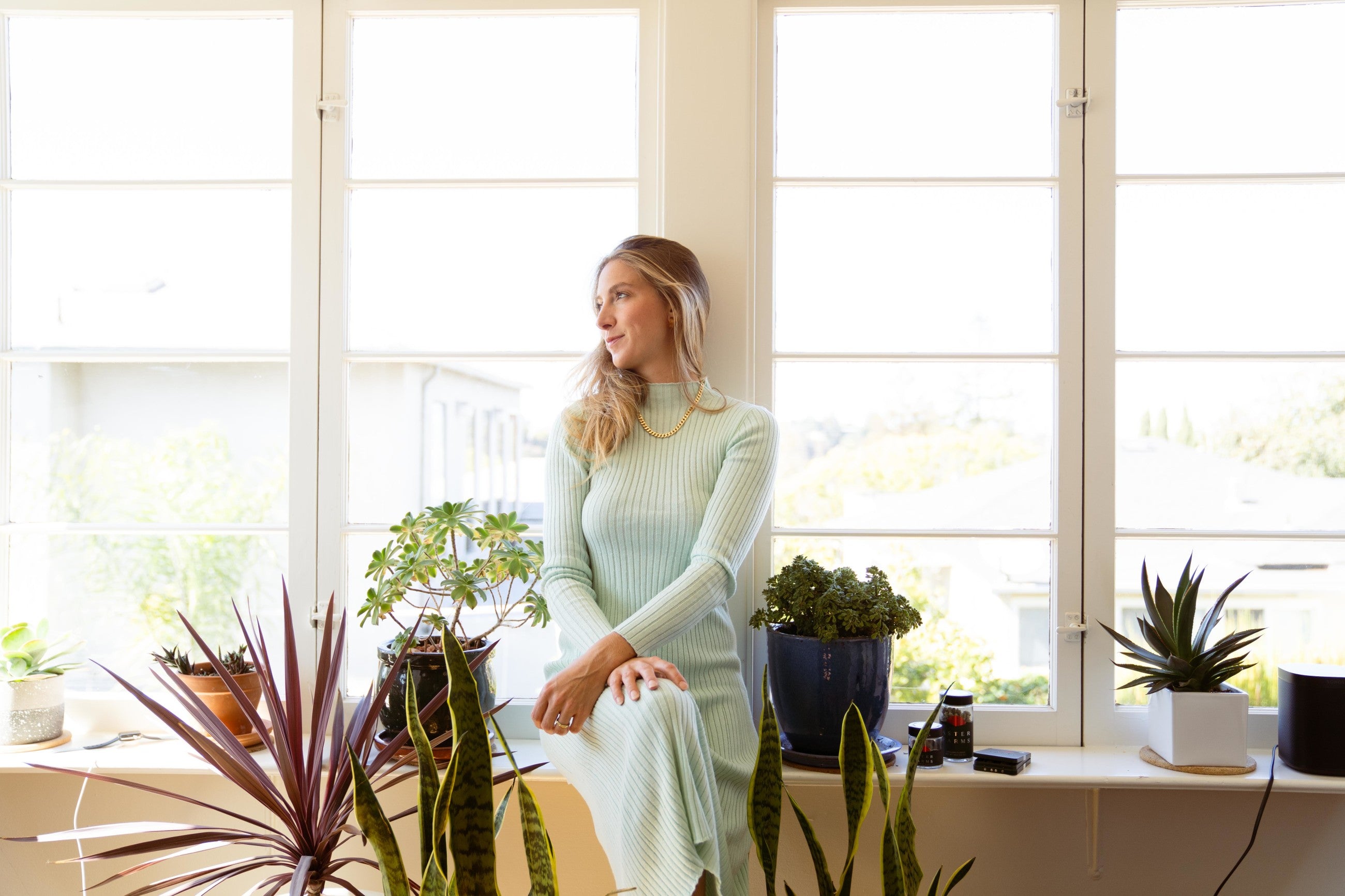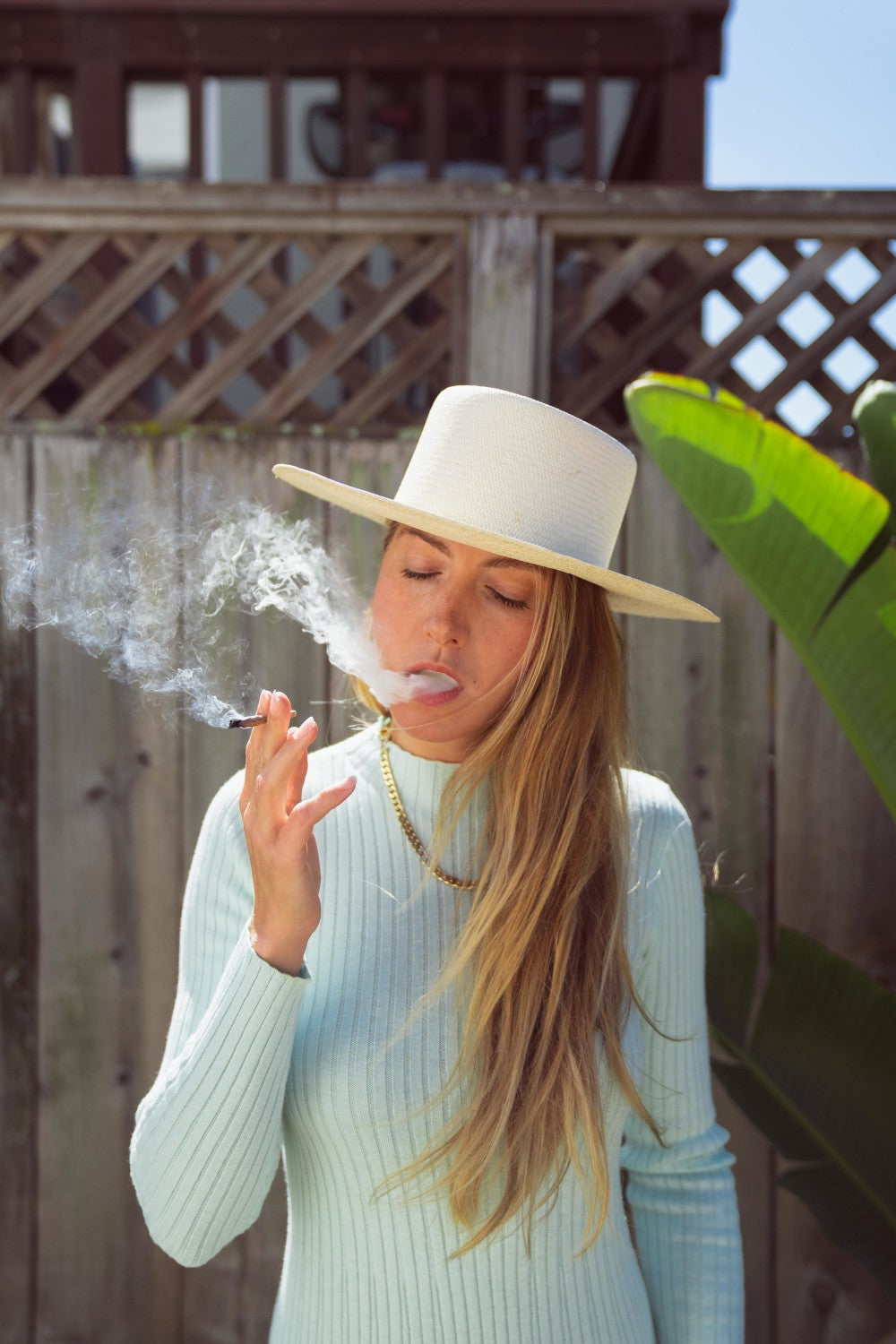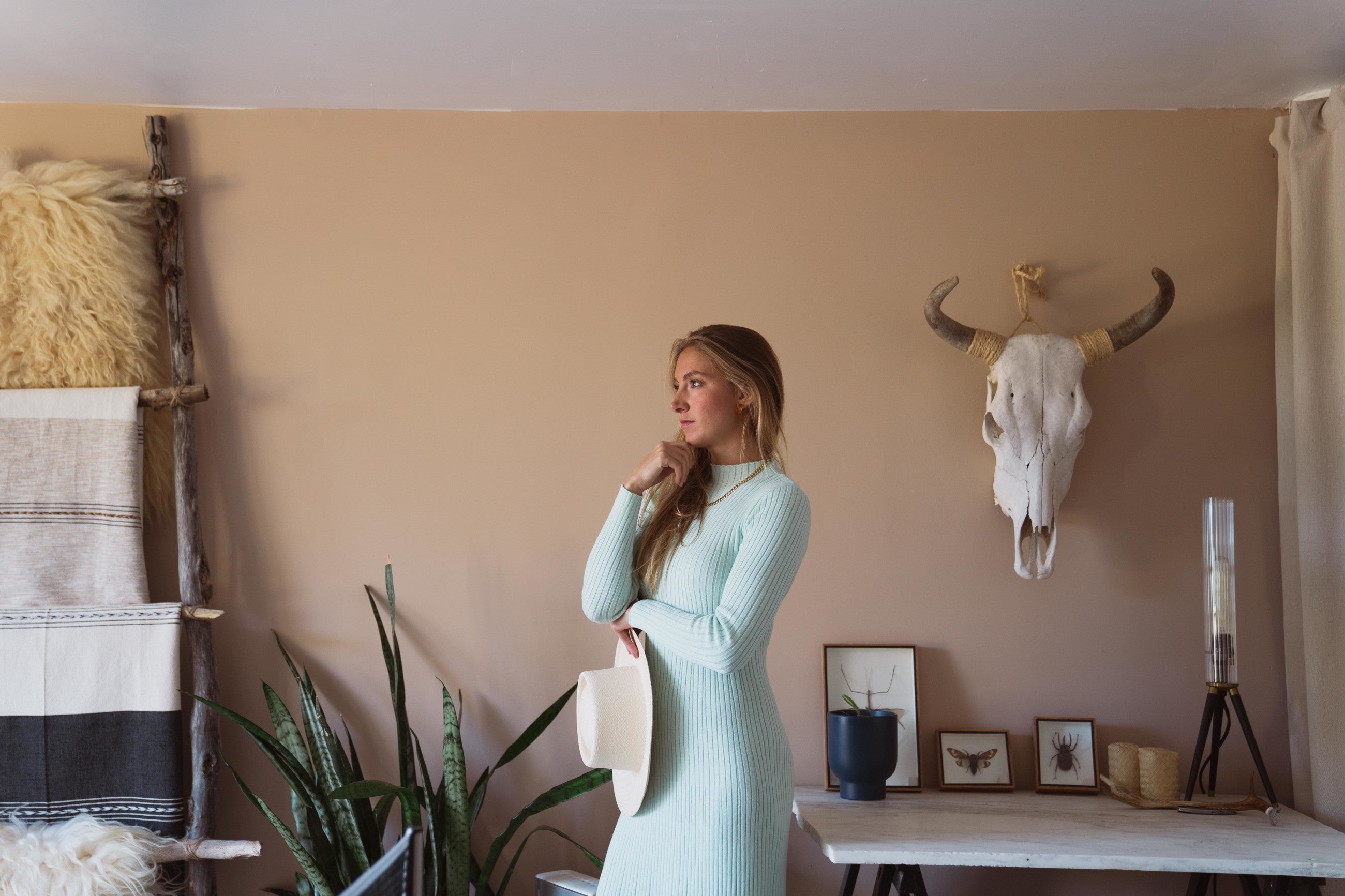

The Aster Farms co-founder on old-school farming, working with your husband, and which strain is best for migraines.
AS TOLD TO PATTY CARNEVALE
One of the things I think about a lot these days is how I've always been a city girl. But now I'm out here wearing overalls and Blundstones and learning about soil and compost and getting super pumped about that kind of stuff. It's been an interesting transition for me. I never in a million years thought that this is where I would be—in my life or in my career or in the world physically in any way, shape, or form.
At our farm—Aster Farms—we use sustainable agricultural practices, which means regenerative farming. Everything is very old school and traditional, and very physical, too. For example, we have a tractor, but we don't attach a rototiller to it to aerate our soil. Instead, we use a tool called a broadfork, which is completely manual and it takes about an entire day for one person to do just a single row in our field.
There is newer technology that gets the job done but destroys the ecosystem, and that's not who we are. That's not how we want to treat the earth and that's not the kind of environment in which we want to grow our plants and our products. Basically, we do things the Amish way. We have literally had people quit because of the broadforking work.
We say that we feed the soil because the soil is feeding our plants, and so it's really important to us to focus on an incredibly healthy ecosystem of microorganisms and insects and nutrients. So a lot of our time is actually spent on optimizing the soil and not destroying the ecosystem that we've developed.
Basically, we do things the Amish way.
I think it all started when I was a little kid. We spent the summers in Michigan, and I would be outside from the moment I woke up until the moment I went to sleep. You could not pull me inside. I grew up in downtown Chicago and moved to New York after college, but I think that piece that just found so much joy in connecting with nature and being outdoors and moving my body was always in me, and it's always been calling.
Now being in California, when my husband and I have free time, we go on a hike. We go and we do something outside. You don't do that in Manhattan. It's been kind of like closing a loop in my life, getting back to some of those experiences that I had when I was little. Just being in nature and working on something that’s not delineated by the rows and columns of an Excel sheet, or the etiquette of an email. Instead it’s questions like whether it’s going to rain this weekend. It’s magical.
Things started to get really bad after I had been in the tech industry for about six years. I have chronic migraines, and they got to a really debilitating level. I was so burnt out. I had this bizarre desire to physically put my hands in some dirt, but I was living in New York—on Tompkins Square Park—so that was definitely some dirt I knew I should not be putting my hands into.
One night, I stayed up until four in the morning researching soil sampling technology, and I actually went so far as to start applying for jobs. I looked at one company that had a business development role where the job description required you to be able to carry 50 pounds alone, and 100 pounds with someone else. That was the moment that I knew this transition was not going to be as easy as submitting my résumé. It was going to be a real process—and a physical one, too.
You know what? I get it though. Being on a farm is a workout. There is equipment that weighs 50 pounds. You can't lift up that broadfork without being able to lift 50 pounds. So I get it.
The transition has been really good for me as a human being, and in terms of my emotional capacity to do anything more than just work.
It was difficult. I mean, I was not in great shape. And it’s physical at every level through the supply chain. Packaging, moving crates of product—everything. At first, Sam—my business partner and husband—and I, along with our cultivation partner, were doing everything. It was a steep learning curve for my body.
But the transition has been really good for me as a human being, and in terms of my emotional capacity to do anything more than just work. It's a release. I spend so much of my week stuck in Excel sheets and in my email, so to be able to go to the farm and have that connection with nature and just work using my body has been really therapeutic. It's what keeps some balance to the insanity that is running a cannabis business.
I’ve experienced all different kinds of strains and growing practices, and I legitimately believe that the effects I get from cannabis that is grown in living soil are significantly better than cannabis that isn’t. There is something magical in those bugs and the compost and all the stuff that is making up the little world down there that we can't even see. Something is happening that I certainly do not know enough about, but it makes beautiful product, and that's what I want to consume and that's what I want other people in my life to be consuming.
My first cannabis memory is knowing that my dad was doing something suspicious in the backyard on a regular basis but having no idea what that was. And my first experience with cannabis was very cliché: It was in high school when my girlfriends made me brownies and convinced me that, "Oh yeah, at least three brownies is what you want to start with." So … I was really fucked up. Really fucked up. But that didn't stop me. I was still into it. And my experience over the last, I would say, 10 years with cannabis has completely done a 180. It went from something that was hilarious to something that is actually medicinal and a piece of what makes me able to live a normal life.
In some ways, it was always medicinal for me and I just never really realized it. In college, I used to smoke before I went to bed, and it helped shut my brain off and helped me sleep. If you look at the industry today, 80% of cannabis sales are for sleep. I think before I even knew what it was doing, I was medicating myself. I've had insomnia my whole life. It's something I've struggled with, and Ambien and other medications have just been horrible for me.

Cannabis also really solved my migraines. I developed chronic migraines in my 20s, which I inherited from my mom. They got to a point that was truly debilitating. I was having trouble working. I was having trouble being able to be part of my social life and my family life and my home life. I was reaching for absolutely any cure. I mean, I got lidocaine shots in my face. I looked like I had two bleeding horns coming out of my forehead. And this is when I was living in New York and the doctor’s office didn’t have a mirror so I had no idea what had been done to me until I realized people on the subway were giving me really weird looks.
No pharmaceuticals were working and they were all giving me terrible side effects. I was constantly in the hospital. Finally, one time, the ER doctor said to me, "If you feel comfortable and have access to cannabis, I suggest you try it for your migraines."
I had never lit up a joint in the middle of an actual migraine attack because when that's happening, I just want to be under 20 pillows in a dark room. But I gave it a try and it totally changed my life. That was the moment for me when cannabis went from something fun, if maybe unconsciously or unknowingly medicinal, to really, truly being something that I actively incorporated to keep me going.

When I have a vomiting migraine, I'm typically choosing an indica because it calms my physical body down.
Stress really can induce and exacerbate migraines. So first and foremost, prophylactically, I am able to microdose and just kind of keep my anxiety at bay, and that helps prevent attacks from coming in the first place. What I use for attacks really depends on where it is in my head and what type of migraine it is. I have ocular or retinal migraines, so I get flashes and spots in my vision. I have vomiting migraines. I have actual headache migraines. So, for example, if the migraine is over my eyes like a mask, then I consume CBG which really opens up the blood vessels in your ocular cavities. When I have a headache migraine, I’ve found that the White Buffalo strain is fantastic.
But each type of migraine is super specific. When I have a vomiting migraine, I'm typically choosing an indica because it calms my physical body down. It really depends, and it's taken me a very long time to figure it all out. I'm still figuring it out. But I was able to go off my prescription medications. I'm able to show up for my life, so I call that a huge win.
The ER doctor told me to use cannabis at the same time that I was obsessed with getting my hands in some dirt, and at the same time that we were learning more and more about my husband's family history in cannabis. So it was one of those things where all signs were pointing in the same direction. Plus there were also rumors that California was going to pass legalization.
We're both entrepreneurs, which means we're crazy people.
We're both entrepreneurs, which means we're crazy people, and we just decided to quit it all and give it a shot. We knew that this plant and this product is really important for many, many people.
My husband’s grandfather, Max, moved his dad's family to Mendocino during the back-to-the-land movement in the late '60s, early '70s. And one of their neighbors happened to be one of the most legendary growers in old school cannabis history, Michael Ommaha. So Sam's uncle, Buddy, quickly got involved with Mikey. They started growing together and the family ranch turned into a cannabis operation. The next thing you know, it’s a full-blown operation and everyone in the family has a role.
Sam's parents were dealers. Two of his uncles were growers. His grandparents helped grow. Everybody got together over the holidays to trim and clean—it was a real family business.

It was when the CAMP—Campaign Against Marijuana Planting—movement really kicked off. This was when they had the military-style helicopters with people hanging out the side with guns swooping over cannabis fields. In the beginning, Sam's family was targeted, and his grandfather became the first person to go to prison for cultivating weed in Mendocino.
The family continued to grow and the operation continued after Max went to prison, but it's a sad and devastating story in their history because it obviously had a really negative effect on the family. At the same time, it's a beautiful story because they were part of the original movement and stood up for growing this product in the right way. They were growing in the ground, in living soil using all organic techniques, and that's what we want to be doing at Aster Farms now. We're walking in their shoes.
We've been interviewing the family, and it's so wonderful to hear them speak. Sam's uncle, Buddy, is just so excited for us and so happy that we're carrying on this family legacy.
You have to be really resilient. You have to be an incredibly crazy risk-taker on every level. You have to be self-motivated. You're creating your own day. There are some people who I know who start to work for themselves, to be an entrepreneur, and it's challenging to keep yourself focused. Other people, like me, get carried away with just working all the time. Being somebody who is able to structure themselves I think is super important.
But really, mostly, it comes to being passionate about whatever you’re working on. I think Sam and I are both very passionate people, and we're not just going to sit there and enjoy the products that are given to us in the market. If there is something that we want, we're going to go out and make it. And so, that's what we did.
The crazy part is, nobody can plan for this. Nobody can study for this. The other day, one of our advisors said somebody coming into the industry is “a great operator from the CPG world” and that he spent two years studying the cannabis industry. I was just like, "Cool. Welcome to the jungle, buddy.” You can't study this shit. It's crazy. The things that go on. I mean, extortion, people pulling out of deals that you could theoretically sue over but you're not going to because you're not an asshole. Stuff that you don't experience in any other industry. It’s the Wild West.

We knew that going in, and that the rules are being written as we progress. But I didn't fully comprehend all of the ramifications of that really meant, and it's intense. I never realized my fingerprints were going to be in the FBI and DOJ's database. I never thought about that until I had to put them in the system. It's intense. It's really intense.
Both Sam and I have run companies before and have not experienced any of the things that we have experienced here. So, as much as my mentors and my advisors have helped me, they are not boots on the ground in this industry. Some of the people who have been the most supportive are actually other founders that I'm friends with, people who are going through exactly what we are going through right now, because you can't can't learn it or experience it until you're in it.
We're business partners with a bond that you can never normally have with another business partner.
Working with my husband is interesting. It’s both the best possible arrangement we could have and also the worst. We try so hard to have a life outside of cannabis. We'll go out to dinner and promise ourselves that we won’t talk about it. And within 20 minutes, you just can't help it. But again, it's because we're both just so excited about it that we can't hold it in. It's 24/7. We're business partners with a bond that you can never normally have with another business partner. I love working with him.
When we lived in New York, we would stoop sit every night and look out on to everything that was unfolding in Tompkins Square Park and just listen to each other's days. It was always exciting to be with somebody who was pushing the boundaries with what he was doing with his own career and really reaching for something more than what was just in front of him. Those were some of my happiest moments, us just sitting on our stoop and telling each other about our day.
We love to adventure, whether that's a car ride or exploring a little town. In cannabis, you're driving a lot. I mean, we drive the full state all the time. It's insane. We've been spending time pulling off the road, making little detours, and getting to explore these towns we've never even heard of. That's been a nice thing—that the two of us can get away for a minute and do it together.
This interview has been edited and condensed for clarity. Julia Jacobson photographed by Simrah Farrukh in Oakland. If you like this Conversation, please feel free to share it with friends or enemies. Subscribe to our newsletter here.